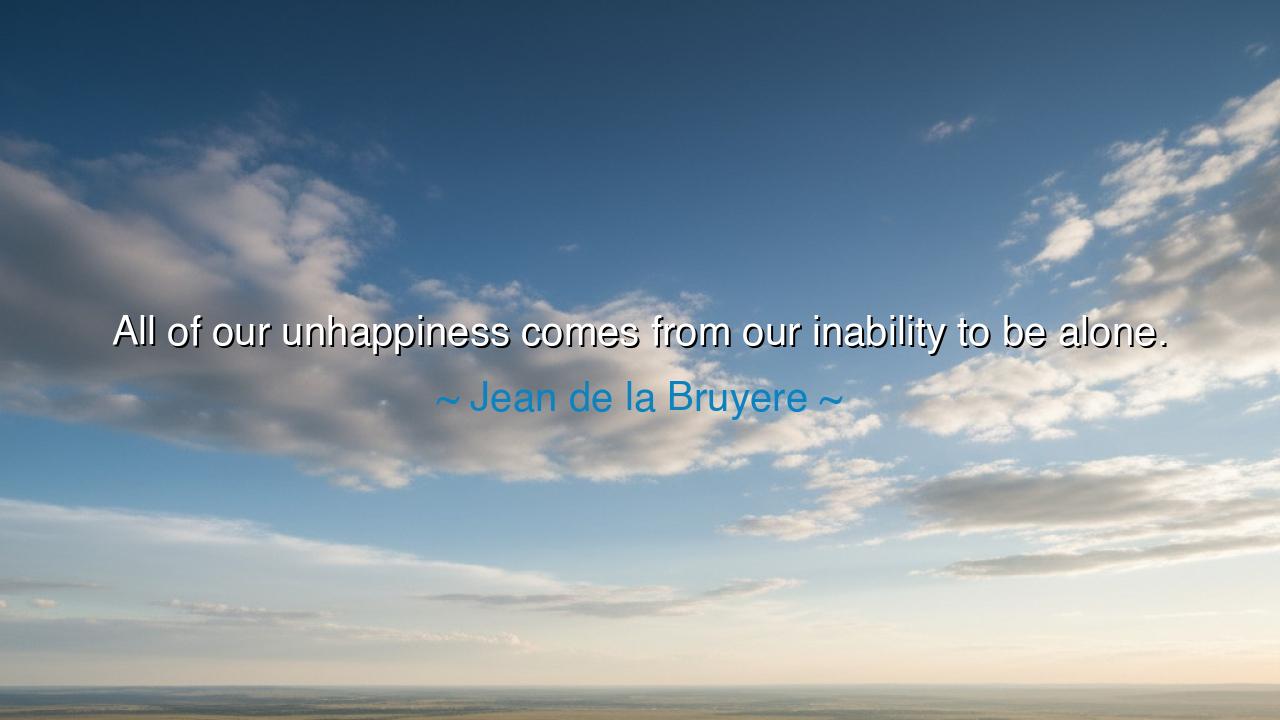
All of our unhappiness comes from our inability to be alone.






"All of our unhappiness comes from our inability to be alone." These words by Jean de la Bruyère strike at the very core of the human condition, addressing a deep-seated truth about unhappiness and solitude. In a world where we are constantly surrounded by others, constantly seeking connection and validation, the idea of being alone can seem foreign and even uncomfortable. Yet, La Bruyère’s insight reveals that our inability to be alone—to sit with ourselves in peace, to embrace our own company—often leads to a sense of inner emptiness and dissatisfaction. True happiness, he suggests, is not found in the company of others, but in the ability to be at peace with oneself in solitude.
In the ancient world, the wisdom of solitude was often cherished by great thinkers. The Greek philosophers, for example, understood that the ability to spend time alone was a sign of self-mastery and wisdom. Socrates famously said, “An unexamined life is not worth living.” For Socrates, solitude was the space in which one could reflect, question, and grow. His life, dedicated to the pursuit of truth, was one in which he often withdrew from the distractions of society to examine the deeper questions of existence. This withdrawal was not a rejection of the world, but an essential part of self-discovery. The ability to be alone, to turn inward, was seen as a pathway to greater understanding and peace.
Consider the life of Diogenes, the great Cynic philosopher, who chose to live in complete solitude and simplicity. He rejected the societal norms and comforts of his time, living in a barrel and often engaging in provocative acts to challenge the values of the day. Diogenes understood that true freedom came not from the approval of others, but from self-sufficiency and the ability to be content with one’s own company. His solitude was not a sign of loneliness, but a conscious choice to live authentically and free from the distractions of societal pressures. Diogenes found that in solitude, he could strengthen his mind and spirit, making him impervious to the unhappiness that comes from reliance on external validation.
Similarly, the Stoics, such as Seneca and Epictetus, wrote extensively about the importance of inner peace and solitude. They believed that true happiness could only be found in cultivating an inner life, free from the disturbances of the world. Epictetus famously taught, “Wealth consists not in having great possessions, but in having few wants.” His philosophy emphasized the importance of self-reliance and inner strength, ideas that are deeply connected to the ability to be alone. For the Stoics, the ability to be at peace with oneself, even in isolation, was a sign of strength and wisdom, and the path to freedom from the unhappiness that stems from dependence on others.
In contrast, the modern world often teaches us that happiness comes from external sources: relationships, achievements, and material success. We are constantly told that to be happy, we must surround ourselves with people, consume more, and achieve more. Yet, this pursuit often leads to a sense of emptiness, as our desires and insecurities continue to grow, fed by the constant pull of society. La Bruyère saw this as a dangerous cycle—the inability to be alone with ourselves leads to a constant craving for external validation, and unhappiness follows. We seek fulfillment in others, in accomplishments, in distractions, but true contentment, he suggests, can only be found in self-acceptance and the courage to be at peace in solitude.
The lesson here is clear: solitude is not a burden but a source of strength and wisdom. As Socrates, Diogenes, and the Stoics recognized, it is in solitude that we come to understand who we are, free from the judgments and distractions of the world. True happiness is not dependent on others, nor is it something that can be bought or earned—it is an inner state that arises when we accept ourselves and learn to find peace within. Solitude is not about isolation, but about reconnection with our true selves, away from the noise and expectations of the world.
In practical terms, we must learn to value solitude in our lives. This doesn’t mean rejecting relationships or love, but it does mean cultivating the ability to be content in our own company. Whether through meditation, journaling, or simply taking time each day to be still and reflect, we can begin to find peace in our solitude. The more we can embrace solitude as a source of strength, the less we will depend on external factors for happiness. In doing so, we create the space for true self-discovery and inner peace, which are the foundations of a fulfilled life.
In conclusion, Jean de la Bruyère’s words offer a powerful insight into the human condition: that unhappiness often arises from our inability to be at peace with ourselves, to be alone without fear or discomfort. The ancients knew that true wisdom and happiness are found not in the distractions of society, but in the ability to reflect, to be self-sufficient, and to cultivate an inner life. Solitude, when embraced with understanding, becomes a tool for growth and self-realization. Let us, then, learn to value solitude, recognizing it not as an absence, but as the presence of peace, and in that peace, we find the strength to live a life of purpose and authenticity.






AAdministratorAdministrator
Welcome, honored guests. Please leave a comment, we will respond soon